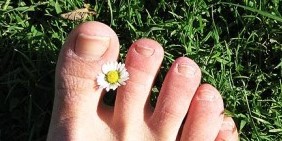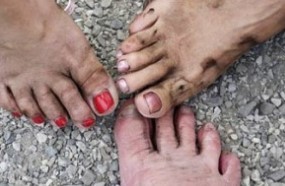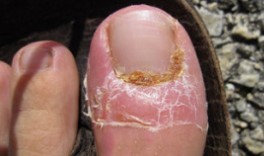Nail fungus (onychomycosis) is one of the most common infectious pathologies that are difficult to treat. According to statistics, every third inhabitant of the planet suffers from fungal infections, which not only affect the skin and nails, but also cause more serious health problems. In advanced cases, the presence of fungal pathogens internal organs suffer, there is a reduction in the General and local immunity and often develop complications associated with the accession of secondary bacterial infection.

To completely get rid of the fungus is difficult, the process of treatment is long, which requires careful adherence to medical recommendations. And, if you do not bring therapy to the end, high risk of relapses and the progression of the disease. In the pharmaceutical market today is a large assortment of drugs antifungals in order to cope with the infection. This is not only of ointments, gels, sprays, varnishes, and systemic drugs intended for oral administration. Tell me more about how to cure the fungus of the toenails and which a medicine according to the opinion of doctors, mycologists and dermatologists are the most effective way to solve the problem. But the first stop in the first symptoms of infection and modes of transmission.
Nail fungus — causes of the infection
Doctors have identified a few main causes of yeast infection:
- The direct contact with a vehicle of the fungal infection
- Not observing the rules of hygiene
- Immunity reduced
- Injuries to the feet due to wearing uncomfortable shoes
- Chronic diseases
The fungus infection occurs due to the violation of elementary sanitary-hygienic norms or in contact with the media. For example, can be infected with the family if one of its representatives suffers from onychomycosis. There are enough to wear someone else's Slippers, of common use a towel or other items for the home.
Fungal infection can be easily collected in public places with high temperature and humidity (in the pool, shower, sauna, public bath, gym). That is where there is a microclimate favorable for the development of fungal pathogens and to create the conditions for the contact of bare feet with the infected surface. The fungi grow and thrive in moist and warm environment. Long can you survive on all surfaces (benches, on the floor carpet). If the person is in a public place barefoot, the fungal spores get on the feet, fingers and nails.
Door of entry of the infection are small cracks, abrasions, corns, sores on feet, caused by the door tight and uncomfortable shoes. But even in this case, the infection can occur if a person has a good immune system, able to cope with the infection. If the immune system is weakened, the infection can not be avoided. The appearance of the fungus often contributes to excessive sweating of the feet or underlying chronic diseases (diabetes, psoriasis, varicose veins).

The fungus first affects the skin of the feet and the area between the toes and then spreads to the nail plate, where in the absence of timely treatment continues to grow and multiply. The infection develops slowly, so that in the early stages in order to detect the fungi of the toenails is difficult. In order to deal effectively with onychomycosis, the treatment should begin as soon as possible, so that the first sign of infection is necessary to know everyone.
Symptoms and photos
The first signs of fungus on the feet is the sensation of burning and itching. The skin of the foot, between the toes begins to take off, it seems that the bubbles, which bursting, form cracks or sores. If the time does not begin treatment, the fungus spreads over and penetrates under the nail, the choice of the location of the space under the nail where there are the nutrients necessary for its further reproduction and growth.
Protected under the nails of the plate, the fungus starts to produce special enzymes that can destroy tissue and the stratum corneum and contribute to the growth of the filaments of the mycelium. In the early stages of the infection symptoms are practically invisible, so few people pay attention, but the more progress they begin to appear the symptoms typical:
- Change the look of the nail plate. It becomes boring, it will appear yellow or white points specific longitudinal or lateral stripes. With time, the more the nail changes color and may become completely yellow, gray or even black.
- Around the nails, the skin and the toes may be red and inflamed. This process is accompanied by itching and pain of the inflammation of the area of the skin.
- Nails start to become thicker, crumble, warp and if not treated can be loose from the nail bed.
The nature of the injuries depends largely on the species of fungi. Therefore, when infected by dermatophytes, a common symptom is the appearance of yellow spots and longitudinal stripes in the centre and at the edges of the nail plate. If the nail has yeast and fungi, their activity destructive starts on the sides of the nail, which gradually becomes yellow and begins to be left behind in the nail bed. If the nail is black, and after these changes are probably caused by the mold fungi.
One of the serious complications of mycosis is an ingrown nail. The nail plate affected by the fungus, is complicated by the time, grows the wrong way, twisted and cuts to the skin. The result of ingrown nails say about myself severe pain when walking, hurt the skin and cause bacterial infection secondary. The tip is red and swollen, from under the nail plate pus. The man with a sick nail can be difficult to walk due to the pain. This complication is especially dangerous for diabetics, as it can cause gangrenous lesions on the extremities.
If you don't start treatment at the first adverse symptoms of the disease will progress and the growth of the fungus spreading to all the nails. In complex cases, the fungus infection begins to suffer throughout the body: there are allergic reactions, disorders of the digestive system and other symptoms of poisoning caused by the penetration of fungal toxins into the circulatory and lymphatic system. At the first disturbing symptoms should consult with a specialist who will select the best treatment plan and recommend an effective remedy for nail fungus.

Treatment of nail fungus
At the first sign of foot fungus of the need to take active measures for their removal, we should not expect that all the symptoms disappear by themselves. This will not happen. Fungal infection and with time will progress and can lead to serious health problems. Therefore, the earlier treatment begins, the more chances you have to get rid of onychomycosis forever. Today in the Arsenal of dermatologists and mycologists are very effective cure for fungus of the nails of the feet-General and local action.
In the initial phase of the disease, when the affected area is minimal, we can restrict the application of local anti-fungal drug with a broad spectrum of action (ointments, creams, solutions, varnishes, aerosols). If the process has gone too far and completely nail affected by the fungus, part of a comprehensive treatment include antifungals for systemic effects in tablets. The majority of these drugs have serious contraindications and side effects, and assigned a specialist and the treatment is carried out under their control. Will focus more on products intended for the treatment of the fungus.
Solutions, coatings. In the initial phase, you can use an antifungal solution and nail. The range of facilities is very varied.
Ointments, gels, creams.
For external treatment of nails affected by fungus, used group of drugs on the base of terbinafine, naftifin, ciclopiroxolamine, ketoconazole.Capsules, tablets.
Complicated forms of fungal infections external treatment is supplemented with the antifungal medicines in the form of pills. Without systemic antifungals is necessary in the cases in which the disease progresses, and treatment is only local media is ineffective. Drugs for the treatment of fungus is very to pick them up have experienced physician since many of them have serious contraindications and limitations of use. This type of fund can not be taken by children, pregnant women, patients with disorders of the liver and kidneys. The effectiveness of these products is very high, in combination with topical agents fails to achieve lasting results and to deal with onychomycosis, avoiding repeated relapses of the disease.Media for the removal of the nail.
If the nail is struck of all, before you start the treatment it is better to remove. Alternative surgical methods are special cosmetic means to safely remove the nail affected by the fungus.Treatment of nail fungus on legs folk remedies
There are many folk recipes, helping to stop the spread of mold and treat it in its initial stages. Present to your attention a few popular recipes used for the treatment of toe nail fungus at home.
- Kombucha. Effective cure for fungus is to compress using plates Kombucha. It is wrapped in a sterile bandage, apply to the nail and fixed it with a band aid. This compress may be left for the night, so we did not put a foot wearing a sock. During the procedure you may feel a burning sensation, but for the good of the patient. In the morning the poultice is removed, the softened stratum corneum removed with a tool, the surface of the nail is treated with an antiseptic solution.
- Creolin. It is a cheap remedy with a veterinary antiparasitic and a powerful disinfectant effect. It should be used with great care, avoiding contact with healthy skin, as it is possible to burn. To avoid this, a strip of skin around the nail you need to seal the plaster. The machine of nail is treated with Creolin once a day for 2 months until full recovery.
- A foot bath. To eliminate the fungi can be done on foot baths with Apple cider vinegar or lemon juice. The procedure lasts no more than 15 minutes. Good effect gives nails with a solution of propolis, sodium bicarbonate or salts Epsom. The nails can be covered with tea tree oil, lavender, oregano, have antiseptic and antifungal activity. Many folk recipes based on the use of garlic, vinegar, alcohol, onions. Before you use these recipes for yourself, don't forget to consult with your doctor.

Prevention of the disease
To avoid the fungal infection, follow these simple recommendations:
- Don't go barefoot in the pool,the bath, the gym and other public places. In areas with high humidity, you may need to bring Slippers of rubber or slate. As measures of prevention are applied to the nails, an antifungal lacquer, it will protect from the infection.
- Never use someone else's shoes, Slippers, socks, towels and other items for the home. All personal care products and pedicure tools should be strictly individual.
- Wear comfortable shoes made from natural breathable materials. Shoes should not be tight, to RUB and injure the foot.
- The feet should be washed twice a day, morning and evening, and the day to change socks and stockings. After treatment of water for cleaning the feet dry, very dry the skin between the toes.
- The fungus is particularly active, with a reduction of the immunity. In order to see your health, the time of treatment of comorbidities, taking immunomodulatory drugs. Maintain the body's defenses adequate and balanced nutrition, eat more vegetables and fruits rich in vitamins and trace elements.
- During the process of treatment of the shoes with solutions antiseptic, this will help prevent the recurrence of the disease. You can disinfect your shoes with a solution of formalin or vinegar, carefully treated inside. After treatment, a cotton swab moistened with an antiseptic solution, should be put in the tip of the Shoe and put it in a plastic bag hermetic during a day.
These simple prevention measures help to protect yourself from mildew and keep your feet healthy. Remember that the fungus of the toenails is treated with a long and hard, this is why it is important to prevent the occurrence of athlete's foot, carefully observe hygiene standards and to react to any adverse changes that may be the first signs of infection.





























